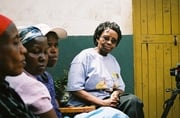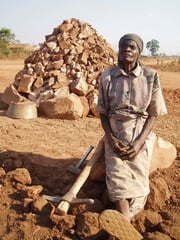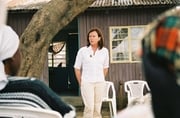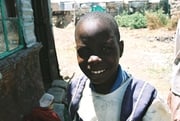Eleven-year-old Nancy is having another one of those days. She doesn’t have the energy to play with her sisters and brothers. Nancy is HIV positive. Her father died of Aids and her mother is also HIV positive. She lives in a dark, toilet-sized corrugated hut with her large family located in the Kibera slums in Nairobi, reported to be one of the worst slums on this planet.
Welcome to the reality of life for millions of people who live and die with HIV and Aids in Africa.
This one-hour documentary spends time with Nancy and other people from Kenya and Malawi whose lives have been taken over by HIV and Aids. Thousands and thousands of people from these regions have died – they call them the missing generation, that includes many of the nation’s teachers, nurses and doctors – parents gone leaving behind vast numbers of orphans. Families and communities have been torn apart and social structures wiped out.
But within this bleakness we also see hope for the future. While spending time on the ground with former Irish nurse Mary Donohoe and her small organisation, The Rose Project, whose sole purpose is to give financial and medical support to some of the smaller HIV and Aids support groups in these countries, we witness a courageous local response to this pandemic.
Local women are leading the way and we are seeing real glimmers of hope from within these communities.
We meet the extraordinary Professor Elizabeth Ngugi a 65-year-old activist in Nairobi who spends her time getting women and children out of prostitution. We are with ‘The Professor’ as she visits the Eden brothel in Nairobi with her bag full of condoms – most of the women she meets are HIV positive and living in a vicious poverty trap trying to support their families.
We spend time with granny ‘Agogo’ who is struggling to look after her six grandchildren as her children have been wiped out by the virus. Her only means of income is by breaking rocks on the roadside and selling them to builders.
We visit a very remote village in Malawi and witness a public awareness gathering where locals discuss abstinence and the myths and stigma that surround HIV and Aids.
Through Mary Donohoe and the local organisations she is supporting on the ground we look at the on-going issues like access to ARV drugs; lack of drugs for infected children; the complexities of mother-to-child transmission; the vast numbers of orphans of whom many are HIV positive; the stigmas around admitting that you or anyone in your family is HIV; the complex traditions of sexual restraint and abstinence in a society where women do not have the right to say no; and the shortage of medical staff and resources to deal with this pandemic.
While spending time with locals on the ground we get an insight into the courageous local response to this on-going pandemic.
‘Last year World Aids Day did not get editorial coverage in Irish newspapers and the death toll that day in Africa was 6,000 people – that answers the question why I am doing this.
‘Besides the Black Death this is one of the worst health issues that has ever happened in the history of mankind and its devastation on families is so overriding that everybody everywhere in the world must respond’ – Mary Donohoe, founder of The Rose Project.



